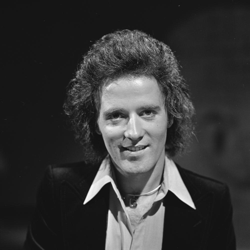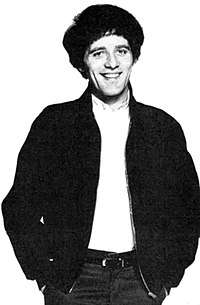Gilbert O'Sullivan
Gilbert O'Sullivan (born Raymond Edward O'Sullivan; 1 December 1946) is an Irish-born British singer-songwriter, best known for his early 1970s hits "Alone Again (Naturally)", "Clair", and "Get Down".[1]
Gilbert O'Sullivan | |
|---|---|
 O'Sullivan on TopPop, 1974 | |
| Background information | |
| Birth name | Raymond Edward O'Sullivan |
| Born | 1 December 1946 Waterford, Ireland |
| Genres | |
| Occupation(s) |
|
| Instruments |
|
| Years active | 1967–present |
| Labels | |
| Website | www |
Worldwide he has charted 16 top-40 records, including six No. 1 songs, the first of which was 1970's "Nothing Rhymed". Across his career, he has recorded 19 studio albums, up to his UK top 20 self-titled record in 2018. Speaking in 2009 he said, "I write pop songs. That's all I want to do. I have no interest in just touring, and living in the past."[2] The music magazine Record Mirror voted him the top UK male singer of 1972.[3] He has received three Ivor Novello Awards, including “Songwriter of the Year” in 1973.[4]
Early life
Raymond Edward O'Sullivan was born in Cork Road, Waterford, Ireland.[5] In 1953, when he was seven, his family moved to Battersea, London; when he was eight they moved to Swindon, Wiltshire, England. He attended St. Joseph's and the Swindon College of Art, where he briefly played drums in a band called Rick's Blues, along with Malcolm Mabbett (guitar), Keith Ray (bass), and founder Rick Davies (who later founded Supertramp) and where he developed his lifelong interests in music and art.[6][7] According to a 1972 interview with O'Sullivan, Davies taught him how to play both drums and piano.[8] Other semi-professional bands he played with while at college include the Doodles and the Prefects.[6]
Music career
In 1967, O'Sullivan was signed to a five-year contract with April Music, CBS Records' house publishing company, after coming to the attention of the professional manager Stephen Shane,[9] who also suggested changing his name from Ray to Gilbert as a play on the name of the operetta composers Gilbert and Sullivan. His songs at the time were avant-garde, and even drew the interest of Vivian Stanshall and the Bonzo Dog Doo-Dah Band, who were interested in recording a couple of them. He was paid an advance of £12 (equivalent to £200 as of 2020), with which he bought a piano. He was signed to CBS Records by the A&R manager Mike Smith, who produced the Tremeloes, the Marmalade and the Love Affair).
After two unsuccessful singles with CBS, "Disappear" and "What Can I Do?", and one with the Irish record label Major Minor, "Mr. Moody's Garden", all released under the name "Gilbert", O'Sullivan sent some demo tapes to Gordon Mills, the manager of Tom Jones and Engelbert Humperdinck, whereupon O'Sullivan was signed to Mills' label, MAM Records.[5][10] O'Sullivan's self-created eye-catching visual image comprised a pudding basin haircut, cloth cap and short trousers. Mills reportedly hated the image, but O'Sullivan insisted on using it initially[11] until he assumed a more modern 'college-like' look in which he often wore a sweater bearing a large letter 'G'.[5]
Early success

At the end of 1970, O'Sullivan achieved his first UK top 10 hit with "Nothing Rhymed",[3] which also reached No. 1 in the Netherlands,[12] where it earned O'Sullivan his first gold disc.[6] Subsequent hits followed including "Underneath The Blanket Go" (which also reached No. 1 in the Netherlands), "We Will" and "No Matter How I Try", the latter being named "Best Ballad or Romantic Song" at the 17th Ivor Novello Awards in 1972.[13] O'Sullivan released his debut album, Himself, in 1971.[5]
In 1972, O'Sullivan reached international stardom with "Alone Again (Naturally)", which reached No. 3 in UK; No. 1 in the US, spending six non-consecutive weeks at No. 1 on the Billboard Hot 100 chart and selling nearly two million copies; No. 2 in New Zealand (11 weeks on the charts in total); No. 1 in Canada for 2 weeks (13 weeks in the Top 40);[14] and No. 1 in Japan (21 weeks on the chart). The guitar solo was played by Big Jim Sullivan.
In total US sales for 1972, O'Sullivan's hit was topped only by Roberta Flack's "The First Time Ever I Saw Your Face". Both songs were nominated for a Grammy Award in the Song of the Year and Record of the Year categories in 1973, but Flack won both.
O'Sullivan followed "Alone" with "Clair" (1972, from the album Back to Front). The single reached No. 2 in the United States on the Hot 100 and No. 1 in the UK and Canada (14 weeks in the Canadian Top 40).[14] O'Sullivan's disc sales exceeded ten million in 1972 and made him the top star of the year.[6] O'Sullivan's success led to him taking part in the BBC's anniversary programme Fifty Years of Music in November 1972.
"Out of the Question" (also from Back to Front) reached No. 17 in the US and No. 14 in Canada.[14] "Get Down" (1973), from the album I'm a Writer Not a Fighter, reached No. 1 in the UK and in Germany,[15] No. 7 in both the US and Canada, and No. 3 in the Netherlands.[3][14] Following "Alone Again (Naturally)" and "Clair", "Get Down" was his third million-seller, with the RIAA gold disc award presented on 18 September 1973.[6] His November 1974 single "Christmas Song" reached No. 12 in the UK and No. 5 in Ireland.
MAM records
O'Sullivan enjoyed nearly five years of success with MAM, a run that included seven UK top 10 singles and four UK top 10 albums; three US top 10 singles and one top 10 album; five Dutch top 10 singles and three top 10 albums; five New Zealand top 10 singles; three Canadian top 10 singles; and seven Japan top 10 singles.[16]
"Ooh Baby" and "Happiness Is Me and You" charted, but O'Sullivan's sales were decreasing.[5] In June 1975, he had his last top 20 hit, "I Don't Love You But I Think I Like You".[3][5]
Things turned more sour when he discovered his recording contract with MAM Records greatly favoured the label's owner, Gordon Mills. A lawsuit followed, with prolonged argument over how much money his songs had earned and how much of that money he had actually received.[17] Eventually, in May 1982, the court found in O'Sullivan's favour, describing him as a "patently honest and decent man", who had not received a just proportion of the vast income his songs had generated.[17] They awarded him £7 million in damages (£24,885,400 as of 2020). Although he had won, the court battle put his recording career on hold.
Later career
In 1980, after a five-year hiatus, he returned to his old record label, CBS.
The first single, "What's in a Kiss?", reached No. 19 in the UK in 1980 and No. 21 in Japan.[16] It was his first UK top 20 hit in five years. Following this release, and due in part to the then-ongoing MAM court case, O'Sullivan released no new material between 1983 and 1986.[5] Apart from the single "So What?" in 1990 and a compilation album in 1991, Nothing But the Best, O'Sullivan was absent from the charts until another compilation album, The Berry Vest of Gilbert O'Sullivan, returned him to the UK top 20 in 2004.[3]
O'Sullivan is also noted for his role in bringing about the practice of clearing samples in hip hop music as a result of the 1991 court case, Grand Upright Music, Ltd. v. Warner Bros. Records, Inc.,[18] in which he sued rapper Biz Markie over the rights to use a sample of his song "Alone Again (Naturally)".[5] He won 100% of the royalties and made sampling an expensive undertaking.[19]
O'Sullivan has continued to record and perform into the 21st century. He enjoys particular acclaim in Japan.[5] His album A Scruff at Heart was released in 2007, featuring "Just So You Know". On 14 July 2008, O'Sullivan released "Never Say Di". He appeared at the 2008 Glastonbury Festival, and played London's Royal Albert Hall on 26 October 2009. On 26 August 2010, O'Sullivan announced that he had joined Hypertension, a record company whose artists have included Leo Sayer, Chris DeBurgh, Fleetwood Mac and Gerry Rafferty.[20]
His album Gilbertville was released on 31 January 2011; it featured "All They Wanted to Say", which dealt with the 2001 attacks on the World Trade Center, and his single "Where Would We Be (Without Tea)?". On 19 July 2011, O'Sullivan played live on the BBC Radio 2 Ken Bruce Show.[21] On 26 August that year, the documentary Out on His Own was broadcast by BBC 4 (before by Irish RTÉ). In March 2012, the compilation album Gilbert O'Sullivan: The Very Best Of – A Singer & His Songs entered the UK Albums Chart at No. 12. 2015 saw Gilbert re-emerge on Irish and BBC radio and television. He toured Ireland beginning of June, and on 8 June 2015 his Peggy Lee-inspired new album Latin ala G! was released.
On 24 August 2018, O'Sullivan released his 19th studio album Gilbert O'Sullivan. The album entered the UK Album Chart at No. 20, his first UK charting studio album for over 40 years.
Personal life
O'Sullivan purposely avoided dating at the peak of his career; he feared that doing so would inhibit his songwriting abilities.[22] In January 1980, O'Sullivan married his Norwegian girlfriend Aase. Later that year, the first of their two daughters, Helen-Marie, was born. Tara was born two years later.
Discography
See also
References
- "Gilbert O'Sullivan Articles". Gilbertosullivan.net. 31 October 2007. Retrieved 13 January 2012.
- "BBC Four – Gilbert O'Sullivan: Out on His Own". Bbc.co.uk. 29 August 2011. Retrieved 22 April 2013.
- Roberts, David (2006). British Hit Singles & Albums (19th ed.). London: Guinness World Records Limited. p. 411. ISBN 1-904994-10-5.
- "Biography". Gilbert O'Sullivan. Retrieved 3 April 2018.
- "Biography by Jason Ankeny". Allmusic.com. Retrieved 5 March 2009.
- Murrells, Joseph (1978). The Book of Golden Discs (2nd ed.). London: Barrie and Jenkins Ltd. p. 318. ISBN 0-214-20512-6.
- Harrison, Flicky (28 December 2016). "Gilbert O'Sullivan's far from Alone Again as musicians reunite". This Is Wiltshire. Retrieved 13 January 2017.
- Melhuish, Martin (1986). The Supertramp Book. Toronto, Canada: Omnibus Press. p. 18. ISBN 0-9691272-2-7.CS1 maint: ref=harv (link)
- 'In 1967 ... [h]e took a part-time Christmas job at the C&A department store on Oxford Street. While there, a colleague brought his tapes to the attention of the CBS record company executives. They liked what they heard, and he was signed up.' Ireland's Own, 12 June 2015, No. 5501, pg 9
- "Gilbert O'Sullivan", ClassicBands.com, accessed 9 January 2013
- Jones, Peter (20 March 1974). "Gilbert O'Sullivan" (PDF). Record Mirror: 14. Retrieved 9 June 2020.
- "Top40 Chart". Top40.nl. Retrieved 27 October 2017.
- "1972". The Ivors. Retrieved 3 April 2018.
- Chartsurfer.de. "Get Down von Gilbert O'Sullivan". Chartsurfer.de. Retrieved 27 October 2017.
- "The Official Gilbert O'Sullivan Website – A Friend of Mine". Gilbertosullivan.com. Archived from the original on 11 August 2005. Retrieved 22 April 2013.
- Rice, Jo (1982). The Guinness Book of 500 Number One Hits (1st ed.). Enfield, Middlesex: Guinness Superlatives Ltd. p. 149. ISBN 0-85112-250-7.
- Grand Upright Music, Ltd. v. Warner Bros. Records, Inc., 780 F. Supp. 182 (S.D.N.Y. 1991)
- Stanley, Bob (25 August 2011). "Gilbert O'Sullivan: time for a reappraisal?". The Guardian. Retrieved 11 March 2017.
- "Hypertension " Artists". Hypertension-music.de. Retrieved 26 August 2015.
- "BBC Radio 2 – Ken Bruce, 19/07/2011". Bbc.co.uk. 19 July 2011. Retrieved 22 April 2013.
- "Gilbert O'Sullivan | In Print". Gilbertosullivan.net. 2 August 1973. Retrieved 8 October 2016.
- Rees, Caroline (14 August 2016). "Gilbert O'Sullivan: 'Success was the postman walking up the garden whistling my song'". Retrieved 28 December 2018 – via www.telegraph.co.uk.